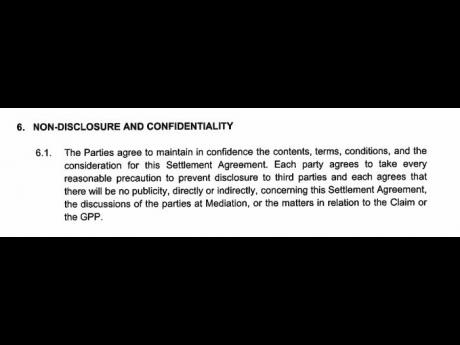NHT comes clean on non-disclosure pact with Dexim Holdings
The National Housing Trust (NHT) has released a settlement agreement that confirms a non-disclosure clause that barred discussions on the terms of the contract over a failed multibillion-dollar deal with private developer Dexim Holdings.
“The parties agree to maintain in confidence the content, terms, conditions, and the consideration for this settlement agreement,” noted the document, which is dated November 29, 2023, which the trust released on Friday following a Gleaner access to information request submitted earlier that day.
It added: “Each party agrees to take every reasonable precaution to prevent disclosure to third parties and each agrees that there will be no publicity, directly or indirectly, concerning this settlement agreement, the discussions of the parties at mediation, or the matters in relation to the claim or the GPP (guaranteed purchase programme).”
The NHT, a state residential home builder, has faced public backlash after The Sunday Gleaner revealed that it signed a settlement deal with a secrecy clause, blocking the public entity from telling its contributors about the matter.
The Sunday Gleaner obtained a copy of the agreement and published the details on January 28. Those reports have now been confirmed.
The NHT downplayed the significance of the non-disclosure clause and indicated on January 30 that the agreement was filed in court on January 15 and could be accessed there.
COULD NOT BE RELEASED
However, on February 2, the Court Administration Division (CAD) told The Gleaner that it could not release the settlement because of the non-disclosure clause.
In light of CAD’s statement, The Gleaner sought a response from the NHT, which was provided on Thursday. It said its “understanding” was that once filed, the document would have been available for disclosure by the court.
“There was no intention to hide the terms of the settlement as, from the inception, the agreement provided for the material terms to be entered as part of the court order, which would then be available upon filing,” said the agency.
It said given CAD’s position, “members of the public are reminded, that they may make a request to the NHT using the Access to Information Act, which is the legislative course for the release of official documents”.
The NHT also repeated its position that the inclusion of a non-disclosure clause in the settlement, “the terms of which were arrived at during mediation, is consistent with the rules of court”.
However, while discussions at mediation are confidential, the rule is different for settlements, argued King’s Counsel Michael Hylton, a former solicitor general of Jamaica.
“The rules to do with mediations and settlement do not require confidentiality of the agreement. The rules require that what takes place during the mediation – the communications the negotiations – must be kept confidential, but if the parties arrive at an agreement, they can decide whether that agreement should be confidential or not,” he said.
Hylton, who made it clear that he did not have any personal knowledge of the NHT-Dexim matter, said that based on the wording of the court’s rules, the “default position is that the agreement becomes part of public record unless the parties agree otherwise”.
“If there is a non-disclosure in the settlement agreement, it was the parties who decided to put it there. It’s not something required by the rules or imposed by anyone,” he added.
Dexim’s attorney, Michael Williams, declined to comment on Friday.
The NHT did not answer previous questions submitted by The Gleaner about who proposed the inclusion of the non-disclosure clause. There are also concerns about why the clause was necessary in the agreement in the first place if the parties knew that by filing it in court, the document would be accessible to the public.
DECIDED ON A CASE-BY-CASE BASIS
The NHT, meanwhile, said it “does not have a standard practice of including non-disclosure clauses in settlement agreements” and that clauses are determined “on a case-by-case basis”.
“The NHT may be required by the rules of court or by operation of law to keep certain matters confidential … . The NHT has always and will always continue to act in the best interest of the public that it serves, and will continue to abide by the rules of court and the laws of the land.”
While stating that it does not have a policy regarding non-disclosure clauses or agreements, the trust said it “is guided by legal principles, rules and norms applicable to contractual agreements”.
The NHT also said it was not in any discussion with Dexim to remove the non-disclosure clause from the settlement.
The trust is funded by a mandatory contribution drawn from the income of employers and workers.
It reports directly to Prime Minister Andrew Holness, who, in February 2019, warned public bodies against the use of non-disclosure provisions that could restrict even Parliament from commenting on certain issues.
At the time, Holness also indicated that he had tasked the then attorney general to review the use of non-disclosure clauses in government.
Gleaner questions submitted to the Office of the Prime Minister on January 29 seeking an update on the review, among other things, remain unanswered.
The NHT sued Dexim in September 2022 after alleging that the company failed to deliver 200 houses under a $2.5-billion contract guaranteed purchase agreement signed in August 2019.
Dexim has rejected the allegations and insisted that its efforts to meet the August 2022 deadline were impacted by COVID-19.
The NHT is reclaiming $650 million that was advanced to the company and which was secured by a bond through a local bank. No houses will be provided. Dexim is also to pay over $20 million to the NHT under the settlement.
Dexim is led by George Neil, a businessman whom the Office of the Contractor General in 2016 warned the Holness administration from doing business with amid the $2.5-billion Caricel telecoms licence saga.

